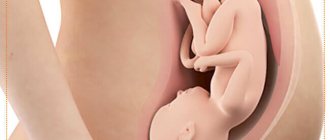Reasons and features
Doctors distinguish several stages of a stressful state: acute, accompanied by a sharp release of hormones, and chronic, which has a serious impact on the psychosomatic state of a person.
Under normal conditions, the first stage of stress is even beneficial for the nervous system - due to an increase in the level of androgens and adrenaline, the body's defenses are mobilized. Chronic stress leads to serious health changes.
Even short-term acute stress has a harmful effect on the body of the expectant mother . The cause of a stressful situation at this time may be minor external irritants: extreme cold or heat, loud sounds, unpleasant smells or sensations, severe hunger or thirst.
But the most severe stress during pregnancy occurs in women who experience unpleasant emotions: quarrels and scandals, resentment, death or departure of a loved one, problems at work. These negative feelings can lead to unpleasant consequences and disrupt the progress of your pregnancy.
Stress and premature birth
Starting work is a complex process that is not fully understood. Multiple hormones and body systems of mother and baby are involved, and predicting when labor will begin is very difficult. Because labor is complex and difficult to study, scientists cannot say with certainty that stress causes premature birth. But there is an association. In other words, research shows that mothers who experience more stress are more likely to go into labor early, so stress increases a mother's risk of preterm labor.
During stressful situations, the body reacts in several ways. For example, your heart rate increases and your blood pressure rises, and hormones flood your body. And it is important to understand that stress can be acute or chronic.
- During acute stress, the body's reaction is temporary and short-lived. After this, the body returns to its normal state.
- With chronic stress, whatever is bothering you continues or repeats itself. As a result, the body never returns to its normal state.
Acute stress does not increase the likelihood that a mother will go into preterm labor. If you, say, argue with your child's father from time to time or sometimes have trouble paying bills, you're not at greater risk.
However, the changes that chronic stress makes to the body are what doctors believe may contribute to preterm labor. Chronic stress causes long-term changes in the body's vascular system, hormone levels and ability to fight infection. These changes could potentially affect the onset of labor before the baby reaches term (at least 37 weeks' gestation). For example, divorce, the death of a loved one, long-term unemployment, or anxiety related to your pregnancy can cause chronic stress, which increases the risk of preterm birth.
Symptoms
A woman does not always notice stress, attributing its symptoms to malaise associated with changes in hormonal levels and physiological processes. At this time, her nervous system is in constant tension, having a destructive effect on the body of mother and child.
A woman needs to learn to identify signs of stress in her well-being. She may experience:
- causeless anxiety and worry;
- apathy, loss of interest in life;
- insomnia or, on the contrary, constant drowsiness;
- decreased normal performance;
- poor appetite not associated with toxicosis.
In addition, she may experience more serious problems:
- increased blood pressure caused by vasospasm;
- rapid heartbeat (tachycardia);
- trembling of fingers;
- increased sweating and dizziness;
- decreased general immune status, colds.
Pathologies
As a result of negative reactions, the pregnant woman's hormone levels increase, which can cause serious health problems.
- Glucocorticoids lead to increased blood pressure and affect metabolism . The expectant mother gains weight and her blood sugar and cholesterol levels rise.
- Mineralocorticoids provoke fluid retention in the body , and the pregnant woman begins to experience constant swelling. Prolactin has a harmful effect on fetal development, which can cause premature birth or miscarriage.
As a result of exposure to hormones, pregnancy pathologies can occur:
- fetal hypoxia due to lack of oxygen . The consequences of hypoxia can be disturbances in brain function, development of internal organs, and even fetal death from asphyxia;
- deterioration of blood supply to the “children’s place” - the placenta . The nutrition of the fetus deteriorates, it lags behind in development and growth, in some cases the pregnancy is terminated;
- distortion of normal hormonal levels can cause labor disturbances and post-term pregnancy;
- The mother may have problems with lactation in the future.
Consequences
Some women claim that they had a physically healthy child.
However, problems may arise in the child later in life. Pediatricians note in such children:
- hyperactivity, restlessness , which leads to problems of adaptation in children's groups;
- speech , reading and writing disorders - stuttering, dyslexia and dysgraphia;
- fears , phobias and neuroses;
- cardiovascular and autoimmune diseases , allergies, asthma;
- bed- wetting;
- birth defects such as cleft lip and cleft palate, requiring surgery;
- developmental delay , autism.
Of course, a little stress during pregnancy does not lead to such terrible consequences, but a woman’s nervous system at this time must be protected from any troubles.
How can a pregnant woman avoid stress?
The occurrence of stress directly depends on the state of the nervous system. To strengthen it, doctors recommend that pregnant women protect their psyche from irritants and their body from overload from the very first weeks. It is especially important to observe a rest and nutrition regime, avoid quarrels and conflicts, and get more rest.
Walk more in the fresh air, listen to pleasant music, think about good things
Expert advice
- It is necessary to maintain peace of mind , learn to relax and look at the world with a positive attitude.
- If you experience fears or anxieties, share them with a close, friendly person : mother, husband or friend. In some cases, contacting a psychologist or attending trainings for pregnant women is indicated.
- If you work and have a career, you need to reconsider your priorities and devote more time to relaxation.
- A full night's, and sometimes day's, sleep is required.
- A pregnant woman's menu must include vegetables and fruits rich in vitamins; a nutritious diet and a balanced eating regimen are necessary.
- Daily calm walks in a quiet place with fresh air are also useful: forest, parks, squares.
- After consulting with your doctor, you can do gymnastics, swimming or other types of physical activity.
- Temporarily review your social circle . If someone you know makes you nervous, try to keep communication to a minimum.
In addition, loved ones must understand that the successful course of pregnancy depends to a large extent on them. In anticipation of a new addition to the family, it is necessary to minimize conflicts and disputes and be more attentive to a woman’s needs and fears.
It is impossible to completely avoid difficulties in the modern world, so stressful situations are possible even in the most prosperous family. To relieve stress, psychologists recommend that pregnant women:
- Proper nutrition and intake of vitamins B, C and E , which strengthen the immune system and nervous system.
- Calm music, including classical music, as well as children's songs - they have a beneficial effect on the development of the fetus.
- Find a hobby or hobby that relieves irritability : handicrafts or creativity are a good distraction from problems and allow the expectant mother to realize herself.
- Connecting with other pregnant women who have a positive attitude is also very helpful and helps combat anxiety. This is why schools for expectant mothers are so popular.
The main thing to remember is that optimism and a good mood will help you avoid problems with the baby’s health and psyche in the future, which is why it is so important to avoid stress during pregnancy.
When a person gets into a state of stress, the normal functioning of the whole body is disrupted, it truly becomes a test in which there is little pleasant. A stressful state during pregnancy is considered unacceptable and brings twice as much negativity not only to the moral and spiritual, but also to the physical state of the woman.
The nervous system of a pregnant woman is simply a “testing ground for open combat”; it is very easy and quick to disturb her calm and put her in a state of stress. These can be emotional and psychological factors (those associated with the loss of loved ones, fear of the upcoming birth, nervous tension) and external factors (in the form of thirst and hunger, cold and heat, physical activity).
During the period of bearing a baby, it is not recommended to be nervous; you should avoid any situations that can lead to a stressful state, since this can negatively affect not only the mother, but also the child.
Evidence for a link between stress and miscarriage.
Not every study examining stress in pregnancy has found evidence of a link to miscarriage. A 1998 study found no increased risk in women who had elevated levels of cortisol and other hormonal markers associated with stress. In this study, there was very little association between psychological ratings and stress hormone concentrations. Meanwhile, a follow-up 2014 observational study examining cortisol levels and in vitro fertilization outcomes, including miscarriage, showed mixed results.
The study found that women who are stressed are more likely to use harmful substances such as cigarettes and marijuana, which can be risk factors for miscarriage. But this study also found that women who reported high stress early in pregnancy did not have a higher risk of miscarriage when stress was considered the only factor.
Causes of stress during pregnancy
Pregnant women have a lot of reasons to be nervous. and especially when a woman is in such a delicate position for the first time.
Below is an example of the most common fears of women in labor:
- Fear for the physical development of the child. In the case of ideal conception, a woman, as well as with frequent examinations, runs the risk of developing abnormalities in the child. To some extent, at this time, medicine has gone far ahead and, of course, checks are not limited only to diagnosing the baby in the womb. If doctors discover any pathologies, they will definitely provide the necessary assistance to eliminate them. If you worry about this, it will only negatively affect the baby’s condition. Precisely because of that. Doctors advise women in labor to calm down, carry out the prescribed examinations on time and take all the necessary tests. The mother’s attention should be focused on the fact that, first of all, she can positively or negatively influence the health of her baby.
- Fear of childbirth itself. The process of childbirth itself is unknown in some cases even to the doctor who has been leading the pregnancy from the very beginning. Women in labor very often worry about the lack of skills and abilities of doctors, and most importantly, many are afraid of pain during childbirth. There is one very effective method for solving this problem; you just need to communicate with women who have already gone through all this. An experienced mother will be able to give you practical advice and dispel all your existing fears. It will also be useful to enroll in courses to prepare for the upcoming birth. You will learn how to breathe correctly and many other useful things.
- Fear of losing former beauty. Many women are afraid of losing their ideal figure, but according to many doctors, such fear is the most groundless. The beauty of women who gave birth not only did not deteriorate after pregnancy, but also became more attractive, bright and spectacular. A small tummy and small sides can be quickly corrected in the gym, the main thing is not to be lazy.
Climate change could lead to a surge in preterm births
Californian scientists have calculated that in recent years, on average, 25 thousand more children were born two weeks premature than in the period 1969–1988. In total, American women miscarried their sons and daughters 150 thousand days annually.
More details
Experts are sounding the alarm and calling for the results of their research to be taken seriously. It has not yet been possible to determine how increased air temperature is related to premature birth.
“It is very likely that being born early will impact a child's development and have lasting consequences into adulthood, but more research is needed to confirm this,” said Alan Barreca, a fellow at the University of California's Institute for the Environment and Sustainability.
Barreca has two theories. The first says that in women, due to hot weather, the level of oxytocin, a hormone that regulates the process of childbirth, increases. According to the second theory, heat causes stress in the cardiovascular system - and the woman’s body strives to cope with this situation.
Alan Barreca and his associates studied 56 million births. They analyzed estimated shifts in daily fertility rates in several counties in the United States over the past 20 years.
Scientists are concerned about data showing a 5% increase in the number of premature births on days when the thermometer readings exceed 32.2 degrees Celsius.
Barreca noted that the average annual temperature in the United States is now about a degree higher than in the pre-industrial era. Because of this, the number of premature births is likely to increase in the coming decades. If now one in two hundred women gives birth prematurely, then by the end of the century the ratio will be more than 1:100.
More details
“This number may seem small, but it is much higher than the risk of getting into an accident,” said the Californian scientist.
He added that air conditioning will provide mothers with protection on hot days, but cooling in this way is very energy intensive and is not available to residents of all countries.
“Many families will experience financial hardship if they have to install additional air conditioning units while a woman is pregnant. Money problems will create stress, which is harmful for both mothers and their children.
According to Andrew Shennan, professor of obstetrics at King's College London, it has long been noted that extreme temperatures provoke preterm birth, but no one has worked to determine the nature of this connection.
Symptoms of stress
Sometimes the expectant mother does not attach any importance to the manifestations of stress, and this is very wrong, since it negatively affects the pregnancy. And the symptoms of stress, meanwhile, destroy the body from the inside. Therefore, all pregnant women should know the signs of stress and be able to take measures to normalize this condition.
Symptoms of stress include:
- Appetite worsens or disappears altogether;
- Dizziness;
- Lethargy;
- Insomnia;
- Reduced performance;
- Indifference and apathy to everything that happens;
- Trembling of limbs;
- Weakening of the immune system, accompanied by frequent colds;
- High blood pressure.
If you experience such symptoms, you should consult a doctor for advice. Indeed, in the body of a woman expecting a baby, under stress, the amount of hormones called glucocorticosteroids increases; they affect genes that have close contact with the placenta. It is for this reason that the effects of stress can be extremely negative.
Some products
Celery, pineapples, viburnum, raspberries, and unripe papaya contain substances that increase the contractile activity of the uterus. Of course, if you eat porridge with raspberries for breakfast and prepare a salad with celery for dinner, nothing bad will happen. The situation becomes dangerous if you consume all these products a lot and regularly. Some herbs include St. John's wort, coltsfoot, and even harmless mint. Therefore, before brewing tea with such additives, you should consult your doctor.
The danger of emotional overstrain
Some pregnant women claim that severe stress did not affect the health of their baby. However, this is a very controversial issue. After all, the consequences of such a condition can arise in the future, when your child becomes a teenager, in elementary school or before it. It is for this reason that doctors boldly say that stress affects the health of newborn babies.
It can be:
- Autism;
- Low weight of the child;
- The onset of premature birth;
- Disturbances in the formation of the fetal central nervous system;
- Hyperactivity;
- Enuresis;
- “cleft palate” or “cleft lip”;
- Fetal hypoxia;
- Phobias;
- Fears;
- Problems with adaptation in any team;
- Development of vascular and heart diseases;
- The occurrence of diabetes mellitus.
In addition, stress can cause weak labor. Contractions do not intensify, as a result of which the duration of labor becomes very long. In such cases. To save a child's life, surgical intervention or drug stimulation is needed.
There may also be problems with postpartum crying. The baby's first cry is an indicator of his vitality. If there is no cry, then there is no breathing activity.
In the blood of the embryo there is a stressful hubbub of the mother. Many hormones protect the baby from its effects. But if cortisone still gets into the baby’s blood, although 10 times less than that of his mother, this is enough to affect the child.
The list of unpleasant consequences of stressful situations is very long, and it should alert not only a pregnant woman, especially one who is going to give birth for the first time, but also the people around her. Relatives need to monitor the woman’s emotional state in order to protect her from negative consequences by any means.
How to avoid stressful situations
The closest relatives and friends should help the pregnant woman remain calm and surround her with only positive emotions. Because her emotional and psychological mood depends on her close environment. The pregnancy period is absolutely not suitable for litter and stress.
Mom must know exactly how to restore her balance.
You should control your own thoughts - do not attract negativity into your life, think about the good, give up unpleasant thoughts. Try not to let anxieties and various fears enter your inner world.
Your mother and husband can help you with this. A close friend or sister is a person who will support you and set you up in a positive way.
- Be positive and try to think about the future baby and his future.
- Spend a lot of time outside, saturating your body with oxygen.
- Your daily diet should include only healthy foods and vitamins.
- Open the windows and let in new air, and also do wet cleaning.
- Sleep time should be 8 hours; if desired, you can take a nap during the day.
- There is special yoga for pregnant women, it will be very useful.
- Make an appointment with a psychologist if you cannot cope with stress on your own.
- Watch children's, kind cartoons, various comedies, listen to classical, soothing music.
- Try to refuse to communicate with people who are unpleasant to you.
Severe stress negatively affects a person’s mental and physical state. Acute shock affects the functioning of the immune system, and health and performance deteriorate. Therefore, during pregnancy, the effects of stress are extremely unfavorable. Not only the mother's body suffers, but also the fetus.
Of course, for nine months you cannot completely isolate yourself from exciting situations, but it is the acute and prolonged stress factor that is dangerous. Powerful emotional trauma can cause the development of various pathologies, for example, missed abortion. But it's not all that scary. Scientists believe that small worries are even beneficial for the female body and the baby’s nervous system. Serious damage is caused only by constant stress and the depth of experience. What consequences, besides missed abortion, can be caused by a long-term stress factor?
The effect of stress on the female body
Long-term chronic stress affects the condition of a pregnant woman as follows:
- Increased blood pressure, rapid heartbeat, breathing problems, tachycardia, dizziness. Some women complain of chest and abdominal pain and persistent migraines.
- In the first trimester, many women are plagued by toxicosis, and constant stress increases its manifestations.
- A pregnant woman is unable to cope with emotions, she may cry often, and is haunted by apathy and fatigue. A stressful state does not allow a woman to relax; she is tense and in a state of anxiety.
- Decreased overall tone and strength. A woman constantly wants to sleep during the day, but cannot sleep at night. This behavior will subsequently appear in the baby.
Exposure to prolonged stress during pregnancy leads to depression, irritability, and dissatisfaction with one's situation.
Mental stress and the course of pregnancy
Regular stressful situations also affect pregnancy. How dangerous is a stress factor?
- Traumatic circumstances can provoke such an undesirable phenomenon as miscarriage. It has been proven that constant worry increases the risk of miscarriage in the first trimester.
- Due to protracted emotional experiences, amniotic fluid may begin to leak prematurely, and this is an unfavorable development of events for the baby.
- In the first trimester, the eighth week of gestation is considered the most dangerous period. At this time, the fetus is sensitive to stressful circumstances and a strong traumatic factor can lead to a missed abortion. In this case, the embryo stops developing. Additional causes of frozen pregnancy include alcohol abuse, infectious diseases, hormonal imbalance, heavy lifting, and previous abortions. But in some cases, doctors do not see any other reason for the appearance of a frozen pregnancy than nervous stress. Signs of a frozen pregnancy may appear in the second trimester, especially at 16 and 18 weeks.
Any deviation from the normal course of pregnancy aggravates the woman’s emotional state. And some pathologies, for example, the occurrence of a frozen pregnancy or miscarriage, have a strong impact on overall well-being.
Causes
On average, gestation lasts for 40 weeks. After this time, the child is ready to live independently. After the due date, mothers begin to worry, turn to the obstetrician, and look for ways to carry out the stimulation process at home.
Reasons why premature birth occurs:
- post-term fetus;
- late gestosis;
- rupture of amniotic fluid;
- Rhesus conflict;
- abruption and placenta previa;
- high water;
- stress;
- age under 17 and over 35 years.
The normal period is considered to be from 38 to 42 weeks. If labor is delayed, the antenatal clinic makes an appropriate diagnosis based on examination and ultrasound, and decides to induce contractions. In the last term, pregnant women experience gestosis, which is accompanied by cramps, high blood pressure, and swelling.
Too young an age for the expectant mother indicates immaturity of the body. She needs care and good nutrition. A woman after 35 years of age should be checked for genetic disorders, eliminate emotional situations, and improve her diet.
What can trigger premature birth:
- stress;
- ecology;
- being in a bathhouse;
- acclimatization when moving.
If the water breaks and labor does not occur for more than three hours, labor induction will be required. If the fetus is without water for more than 10-12 hours, the risk of complications from infectious diseases increases. Sometimes a Rh conflict occurs, which leads to a complicated pregnancy from the very beginning. The woman is often kept in custody. Antibodies pose a threat to the baby, so the doctor decides to induce labor artificially.
A pregnant woman, in order not to give birth prematurely, does not need to engage in intense sports, lift weights, or take long walks. If the expectant mother feels well, do not neglect the rules. This applies to women who are accustomed to constant movement and active life. They give preference to methods specially designed for pregnant women.
Can ARVI cause premature birth? Yes, this is an infectious ailment, which is on the list of diseases that affect uterine contractions. This also includes smallpox, rubella, and influenza. Microorganisms penetrate the placenta, which leads to damage to the fetus. Contractions begin prematurely.
Consequences of a stress factor for the fetus
The mother's fetus is most susceptible to stress. Stress during pregnancy negatively affects the baby for the following reasons:
- Medical experts say that during periods of strong excitement, the baby’s nervous system suffers greatly. If the expectant mother experienced stress during pregnancy, then after birth the child may suffer from hyperactivity, such children are susceptible to various phobias, and their adaptive threshold is reduced.
- Stress in pregnant women also negatively affects the health of the baby. The fetus suffers from intrauterine hypoxia, and after birth the child is susceptible to allergic and asthmatic reactions.
- According to some data, severe stress in the early stages of pregnancy, namely in the first trimester, can trigger the development of schizophrenia in the child. Researchers say the probability is seventy percent.
- The child needs the calm emotions of the mother. If a woman is subject to negative thoughts, then the consequences of negative experiences affect the child’s psyche. A balanced mother can give her child health, both mental and physical. Some scientists believe that the manifestation of a frozen pregnancy should be looked for in the nervousness of the mother.
- The cause of enuresis, diabetes, and autism also lies in the stressful state of the expectant mother. Severe trauma is a factor in many adversities in the baby, for example, prematurity, or the non-viability of the baby.
Stress during pregnancy affects not only the woman, but also her future child. The baby suffers from the mother’s worries and worries. Stress during pregnancy is the cause of many problems.
You should be wary of severe anxiety not only in the first trimester, but throughout the entire period of bearing a child.
In this case, many negative aspects can be avoided, for example, the occurrence of a frozen pregnancy or rupture of amniotic fluid.
- home
- Stress and health
Symptoms and consequences
Some signs will help determine whether labor is starting or not. A woman needs to be careful not to miss time to prepare. If a successful induction of premature labor occurs, there is a nagging pain in the lower back, sudden vomiting, spotting, and frequent contractions that occur in an amount of more than four within an hour. Among the obvious signs is the passage of the plug and amniotic fluid.
Complications. In the process of premature birth, complications occur: perineal ruptures. With rapid labor - uterine ruptures, injuries to the child. Self-stimulation in the early stages leads to the death of the fetus, inflammation of the uterus up to its removal.
Depression. Women often experience postpartum depression. Added to this is emotional pain due to ruptures and caesarean section. The support of relatives is necessary so that subsequent births are not subject to surgical intervention.
Prematurity. The consequences for the baby can be sad. At 28 weeks, difficulties arise with further courtship, maintaining temperature, and brain development. During this period, there is no respiratory readiness, and problems with the sucking reflex arise. A newborn has weak bones and highly vulnerable skin. A woman needs to protect her child. Before conception, plan to check the body's reproductive systems. Mothers with reduced immunity are at risk.
How many decibels can cause premature labor? The indicator is around 150. Despite the fact that a woman is allowed to play pleasant music for the baby in the womb, it is forbidden to turn it on too loudly.












